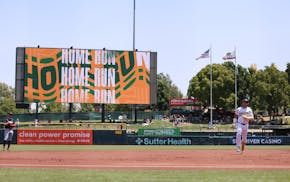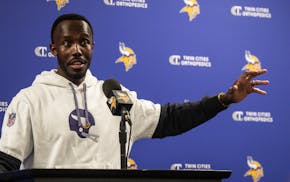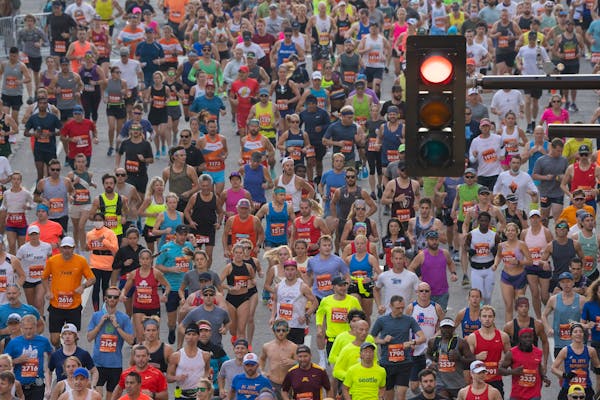Ignoring warnings from race organizers, hundreds of runners took off along the Twin Cities Marathon and 10-mile race routes on Sunday after organizers canceled the events because of the hot weather forecast.
"We were already wheels on motion to get to the start when the 5:30 email came in," said Catherine Bunkers of Woodbury, who had been set to run the 10-mile race. "We threw our bibs on anyway."
"We just said, 'Well, let's see how far we can go in the heat,'" Leia Ward of Medina said.
Runners mixed with Sunday morning dog walkers along the river in downtown Minneapolis on what would have been the racecourse.
Marathoner Wolfgang Schauss of Detroit opted for a training run along the river Sunday morning, instead of trying to run 26.2 miles unsupported.
He remembered a steamy marathon in Richmond, Va., last year where runners dropped out all along the course — and the race did not seem to have enough medical staff and volunteers to help everyone.
He wondered if the Twin Cities Marathon's start time could have been made a little earlier, but said he understood the decision.
"Better safe than sorry," Schauss said. "Especially when you're an endurance runner, you don't always judge your limits."
A lone man with a cowbell greeted runners crossing the Franklin Avenue bridge on the 10-mile course. As runners progressed into St. Paul, more sign-wavers and cheerleaders yelled and clapped for them.
There were no official aid stations along the course, but race organizers had yet to take down portable toilets stationed along the route. A few groups handed out water bottles on Mississippi River Boulevard or poured jugs of distilled water into cups.
Bicyclists veered around runners who took over bike lanes along the river and on St. Paul's Summit Avenue.
On Summit, families handed out banana halves and doughnuts. One house about a mile from the finish offered beer from a miniature keg.
Maya Walker said the support along the course was great. She flew from Colorado to run the Twin Cities Marathon — her first. She said she, like many, were disappointed to hear the race was canceled when the email arrived. But she and her friend decided to get out for a run anyway: "We said, well, we might as well go for a run, and then it seems like everybody just started doing the whole course, so might as well."
Walker said she thinks race organizers made a hard choice. "Safety always comes first, and you've got to make a smart decision for the city to not overwhelm hospitals and paramedics and firefighters," she said.
Others said they wished there had been more transparency from race officials over the decision to call the races off. Lisel Olson has run many races in the past — some longer and in hotter conditions, she said — and on Sunday opted to run a loop from her house along the river and Summit Avenue instead of the official marathon route.
Twenty-two miles in, she said she was unhappy with the decision to call the race off and would have liked more transparency surrounding what conditions would require cancellations leading up to them. "I want to know exactly what conditions constitute a black flag and how that decision came about," she said at 22 miles, as well as whether the cancellation was required under some policy — insurance, legal or otherwise.
On the course, some runners tracked their paces on their watches, hoping to hit their goal times even though the official race was canceled. With roads open, runners had to stop for cars at busy streets crossing Summit Avenue, though some darted into the street at the first break in traffic. Watches beeped as runners stopped and started timers on their way to the State Capitol grounds.
Others just wanted to finish the 10-mile distance, like Hannah Theodore of Minneapolis. Theodore has been dealing with injuries for years, she said, and wanted to prove to herself that she could run 10 miles.
When she learned the race was canceled, Theodore called her friend Azzya Munkhbat to tell her she didn't have to come — but Munkhbat came up early to cheer her on anyway. Both are recent transplants from California, and Munkhbat wanted to be there to support Theodore because her family is so far away.
"She still ran the 10 miles!" Munkhbat said. The two took celebratory photos in front of the Capitol.
Annie Merrill of Woodbury felt there was more camaraderie between runners this year, as they massed on Summit Avenue, passing empty bleachers and lawn chairs. Without the energy of the crowds to draw on, Merrill said, runners relied on each other.
"There was lots of runner support," she said.
At the end of the course, a crowd gathered at an impromptu finish line just before what would have been the official race end, blocked off and already being torn down by midmorning. People greeted running friends and family members with signs and cheers. An SUV filled with people cheering and waving pompoms drove by.
"Yeah, you got it, man, you got it!" said Scott Wojahn, ringing his cowbell as someone finished.
Wojahn, of Rosemount, said he found out the race was canceled on his way to watch, after having run several races in the past. "I came out anyway to cheer them on because I just know how many hours and how much time it takes to cross a 26.2-mile finish line," he said.

Young Twins starters called up to rotation will be asked to do more
David Festa's return to Twins goes south in a hurry
Souhan: For Lynx star Napheesa Collier, 'Phee' is just fine

Vikings GM talks to the Star Tribune about the team's 2025 outlook, McCarthy's trajectory




